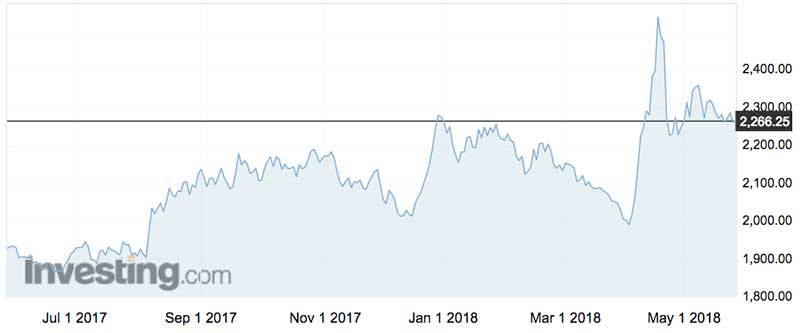Aluminium is priced at a 7-year high, setting up bauxite exporters for a great decade
Mining
Aluminium prices are at highs not seen since 2011 and while this can’t last, several factors mean the industry will continue to grow strongly, say analysts.
A strong aluminium industry means suppliers of the raw material, bauxite, a key Australian export, are set for an extended period of strong growth as well.
The price of aluminium — $2268 on Tuesday evening — has been driven up by regulatory change in China and the impact of sanctions by the US on rivals including Russia.
Analysts are forecasting those prices to ease.
S&P Global expect prices of $US2100 a tonne through 2019, while UBS is forecasting 90 US cents a pound — or about $US1984 a tonne.
Yet industry fundamentals remain strong as new countries ramp up production and China adds capacity at spite of new environmental laws.
Here is the price of aluminium over the past year:

Sanctions, regulations and shutdowns
Section 232, or US tariffs on steel and aluminium, went into play in March.
It included China and Rusal in Russia, the number one and two global producers of aluminium.
China is also trying to moderate supply. It shut down 30 per cent of its production capacity over the northern hemisphere winter before reopening on March 15.
The other driving factor is the halving of capacity at the world’s largest alumina refinery, Alunorte in Brazil.
Two tonnes of alumina are needed to make one tonne of aluminium.
The outage, due to tailings issues and environmental concerns, has caused alumina prices to surge from about $US350 a tonne to around $US550 a tonne, adding an extra $US100 a tonne to aluminium costs.
But while these issues have caused prices to be “unsustainably” high, according to Mr Morgan, other issues will moderate prices and drive the industry.
Where price support is coming from
An S&P report in March said that notwithstanding tariffs and sanctions, strong demand from the global construction and transportation industries would underpin prices.
They expect demand to rise 3-5 per cent in 2018 and 2019, given there is a “modest” deficit of the metal now.
Aluminium is favoured for its weight, strength, and ability to be easily shaped.
It’s favoured in construction, and in aeroplanes and heavy duty vehicles. Every 450 grams of aluminium used instead of steel can reduce a vehicle’s weight by just over a kilo.
UBS commodities analyst Daniel Morgan says the sanctions have created a two tiered market for “good” and “bad” aluminium: the former can be sold anywhere in the world without problems, the latter cannot.
He also says that while economic and environmental rules will bring production growth in China down somewhat, countries like Kazakhstan, Tajikistan, Bahrain, India and Indonesia are all looking to ramp up alumina and/or aluminium production.
“I’m not sure you can say there’s a high constraint of production on the aluminium sector,” he told Stockhead.
The Aussie opportunity: bauxite
Companies producing or preparing to produce bauxite, like Metallica Minerals (ASX:MLM) which is building its fortunes on strong Chinese demand, are looking at a decade of strong demand for their product.
“Bauxite is going to grow volumes substantially over the next 10 years,” UBS commodities strategist Daniel Morgan told Stockhead.
“I think that’s a big opportunity.”
He says China sources half of their bauxite from domestic sources and imports the rest.
“I think China will continue to grow the aluminium industry. As their domestic sources are becoming more troubled, for those two reasons I think imports should grow in volume.”
The Shanxi, Henan and Guangxi provinces are all looking to import bauxite for the first time.
It takes around five to 10 years to bring a new discovery into production, so companies like Metallica, which is on the cusp of becoming a bauxite producer, are set to benefit.
In a 50-50 joint venture with a private Chinese company, Metallica is developing the Urquhart bauxite deposit, which was discovered in late 2014 on the Cape York Peninsula in far north Queensland.
They are waiting on final government approvals and expect to make their maiden shipment this year.
This special report is brought to you by Metallica Minerals.
This advice has been prepared without taking into account your objectives, financial situation or needs. You should, therefore, consider the appropriateness of the advice, in light of your own objectives, financial situation or needs, before acting on the advice.
If this advice relates to the acquisition, or possible acquisition, of a particular financial product, the recipient should obtain a disclosure document, a Product Disclosure Statement or an offer document (PDS) relating to the product and consider the PDS before making any decision about whether to acquire the product.